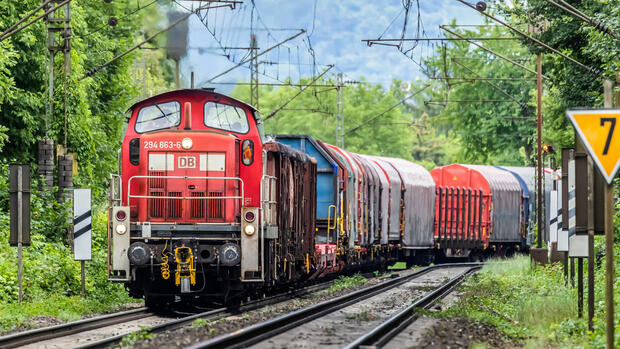Transport Minister Wissing expects more freight trains, but calculates without new routes, criticizing the railway companies.
(Photo: IMAGO/Arnulf Hettrich)
Berlin. The rail freight companies in Germany are mobilizing against Transport Minister Volker Wissing (FDP). They sharply criticize the traffic forecast he submitted, which is intended to serve as the basis for future traffic policy. The Pro-Rail Alliance, the Association of German Transport Companies, the Network of European Railways (NEE) and the Association of Freight Wagon Keepers in Germany jointly reviewed the assumptions used to create the forecast.
The result: the associations criticize that some of the assumed assumptions are wrong or incorrect to the detriment of rail transport. “Rail is logistic, has proven that it has grown disproportionately despite the change in the goods structure, and will also master future structural change with innovative concepts and political momentum at an above-average rate,” they write. The members include the state-owned Deutsche Bahn AG, but also freight trains from other state railways such as SBB (Switzerland), Captrain (France) or TX Logistik (Italy) as well as private providers such as Metrans.
Minister Wissing presented his forecast in March. Accordingly, freight traffic will grow by more than half by 2051, but primarily on the road. Freight traffic is also expected to increase by rail, but at 33 percent less than by road.
According to estimates, the federal government will miss its target of handling a quarter of all freight traffic by rail by 2030. It is currently almost 18 percent. According to the forecast, the proportion will even decrease. NEE Managing Director Peter Westenberger already explained during the presentation: “A forecast does not replace politics” and called for political countermeasures.
The ministry had had scientific premises drawn up in advance and also involved a number of associations. The freight railways, however, attach importance to the fact that they did not agree with the result, but criticized it at an early stage.
Desire and reality in the forecasts
For example, the future CO2 price for fuels is set too low, even lower than the truck toll that has now been decided by the federal government, which should be EUR 200 per ton of carbon dioxide emitted from 2024. Criticism was not taken into account, it is said.
The Transport Minister expects significant growth in road freight transport by 2051.
(Photo: IMAGO/Political Moments)
They also complain that the forecast only assumes abstractly that the rail network will be expanded and digitized. In the case of the motorway network, on the other hand, concrete measures have been named that ensure more capacity, such as the release of hard shoulders. When it comes to rail, neither innovations nor trains that could be 1500 meters long instead of 740 meters if the network were consistently digitized would be assumed.
On the other hand, when it comes to road traffic, there is talk of long-range battery technology for heavy trucks in long-distance transport, of sufficient green energy and a good charging infrastructure. But what will become of these assumptions is far from certain, the railway companies complain.
Nevertheless, it is assumed that almost all heavy commercial vehicles will be operated electrically from 2035 onwards. However, because there are neither affordable trucks nor sufficient green electricity or substations at rest stops for large charging stations, even the government expects in its climate forecast that around 30 percent of truck kilometers will be driven electrically by 2040 – including light commercial vehicles, for which battery drives are faster be used.
Freight railways refer to new logistics offers for parcels and groceries
While Wissing cites the “change in the structure of goods” as the cause of the increase in road traffic – fewer heavy goods such as coal, but more electronics, food and parcels – the freight railways cite new logistics solutions: Rail freight transport has its market share in the transport of food and other so-called short-lived consumer goods increased from a little more than one to a good six percent.
Because fewer bulk goods such as coal will be transported in the future, the demands on logistics companies will change.
(Photo: dpa)
DB Cargo alone transports 1,500 refrigerated containers with fruit and vegetables from Spain to Central Europe every year. DHL, the parcel subsidiary of Deutsche Post, has tripled its transports by rail to six percent and is aiming for a share of 20 percent by 2030.
The freight railways are concerned that the poor forecasts for rail traffic will mean that the state will invest less in the network, in expansion and in digitization. The forecast does not assume that there will be new rail routes by 2051. This is “incomprehensible”, the associations criticize, as the logistics industry expects increasing demand and a need for new routes. They therefore call for sticking to a transport policy geared towards climate targets.
Wissing, on the other hand, had said goodbye to the paradigm according to which traffic should be shifted from road to rail in order to transport in a climate-friendly manner. Rather, he assumes that by 2045 cars and trucks will predominantly be powered by climate-neutral drives. Therefore, when shifting to rail, he is focusing primarily on relieving the road.
More: The federal government wants to support the renovation of the railway network with billions
